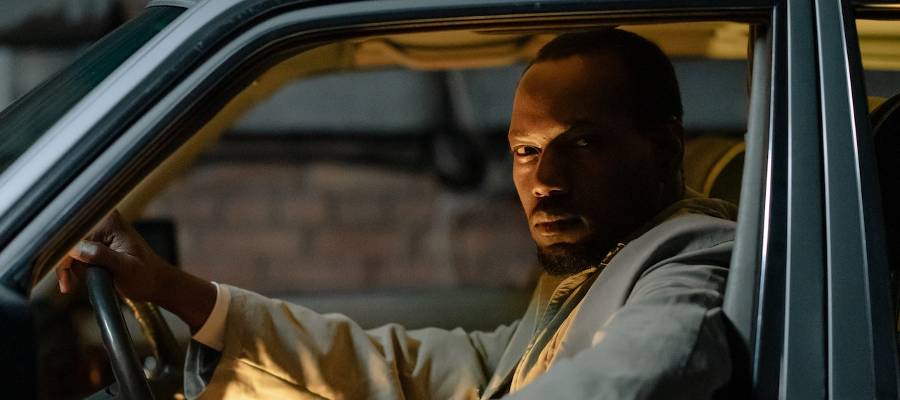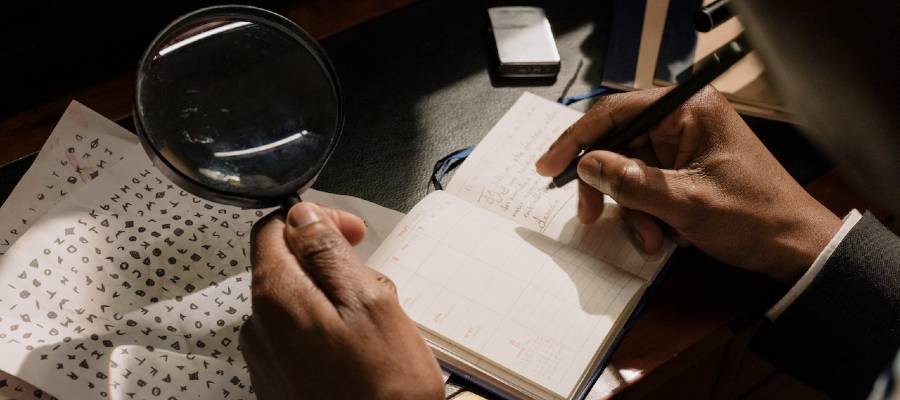How to Write a Mystery
On this page, you'll find a detailed guide to how to write a mystery, along with tips to make your mystery stand out! You can use the menu below to jump to the topics that interest you.
What is a mystery story?
Step 1: Come up with an idea.
Step 2: Plan a crime.
Step 3: Develop your sleuth.
Step 4: Decide on a setting.
Step 5: Lay a trail of clues.
Step 6: Come up with your suspects.
Step 7: Invent some red herrings.
Step 8: Plan the investigation.
Step 9: Figure out your ending.
Step 10: Map out your plot.
Step 11: Start writing!
Step 12: Fact-check and revise.
More tips on how to write a mystery.
How to Write a Mystery - What's a Mystery?

Mysteries are an example of what is called "genre fiction." A genre is a category of commercial fiction which follows certain traditions.
You can think of these traditions as "rules of the game". You don't always have to follow these rules exactly. You can decide to bend, or even break them. But it's important to know what the rules are, so that you understand what readers -- and agents, and editors -- will be expecting from your story.
Most mystery stories involve a sleuth trying to figure out who committed a crime, normally murder. This might be a professional sleuth (for example, a police detective) or an amateur who decides to investigate the murder (for example, because the victim was close to them, or because they themselves are a suspect, or just as a hobby!).
The answer to the question "Whodunit?" is normally revealed at the end of the story. In the meantime, the reader's curiosity grows as they consider clues the sleuth is uncovering.
Many mysteries are set up as a kind of game where the reader tries to figure out the solution before the sleuth does.
This gamelike aspect of mysteries can make them especially fun to read -- and to write!
There are many kinds of mystery stories, including:
- Cozy mysteries, which tend to avoid explicit sex and violence.
- Hardboiled, which often feature a cynical sleuth and show the dark side of human nature.
- Police procedurals, which give an inside look at the methods used by police to solve a crime.
- Paranormal mysteries.
- Historical mysteries.
- And others.
There's no right or wrong approach to how to write a mystery, but here's a process you can try.
1. Come up with an idea.

Here are some ways to get ideas for your mystery story:
- Start with real-life crime. Read the news, research crimes that actually happened, and then imagine a story around them.
- Start with real people. Think of someone you know and imagine what might cause them to commit murder. Maybe you've even fantasized about killing someone yourself. You can use this as the idea for a novel. The mystery writer Sue Grafton says that her first novel began with fantasies about murdering her ex-husband. She imagined how she might go about doing it and a classic mystery series was born.
- Start with a fictional character. Use [this profiling questionnaire to create a character], and then imagine a situation in which they would be driven to murder.
- You can also find mystery writing prompts here.
2. Plan a crime.

When you plan a mystery, you're really planning two stories...
- The story of the investigation, which is the story the reader sees.
- And the story of the crime, which is background to the main story.
You might find it easier to start by figuring out the story of the crime...
- Who did it, and why?
- How did the criminal try to cover their tracks?
- Did they make any mistakes?
- What evidence did they leave behind?
- Were there any witnesses?
- Who saw or heard something that might help your sleuth uncover the truth?
Enter your email below to get our free Crime Scene Worksheet.
3. Develop your sleuth.

Once you have a crime, you need a character to investigate it, your sleuth. The sleuth might be a professional (e.g., a police detective), or they might be an amateur.
If you have an amateur sleuth, you're going to have to give them a reason to investigate the murder. Maybe the victim was someone they knew, or maybe they stumbled on a dead body and then took an interest in the case. Or maybe they're someone who investigates murders as a hobby.
Whatever their reasons, you're going to want to create an interesting character that readers will care about.
You can use this profiling questionnaire to develop your sleuth.
PROFILE QUESTIONNAIRE: YOUR SLEUTH
- What is your sleuth's name?
- How old are they?
- What do they look like?
- Where do they live?
- What’s their relationship status? Do they have children?
- What is their profession?
- What are their hobbies?
- What are some of their personality traits?
- How will they get involved with the investigation of the crime?
- In what ways might the investigation affect them personally?
- What strengths do they have that might help them solve the case?
- What weaknesses do they have that might make it harder for them to solve the case?
Enter your email to get a similar questionnaire for your murder victim.
4. Decide on a setting.

Apart from a crime and a sleuth, your story needs a setting. Where will it take place? Will it be set in the present, or during a historical time period?
In many mysteries, the setting adds a lot of color and interest to the story. Part of the pleasure of reading these stories is that the reader gets to travel in their imagination to places such as Venice (in Donna Leon's Guido Brunetti series) or 1920s India (in Sujata Massey's Perveen Mistry series).
You might decide to set your mystery in a place that you already know well. That will require a lot less research.
Even if the place where you live doesn't seem exotic to you, you probably know lots of insider details that would be interesting to outsiders.
Or, you might choose a story setting that you would enjoy learning about. Writing the story can be a chance for YOU to take an imaginary vacation in an exotic location.
Another way to add color to your mystery, and to get story ideas, is to draw on a hobby or area of expertise you might have.
Examples:
- Jonathan Kellerman, a psychologist, writes a mystery series starring a child psychologist.
- Scott Turow, a lawyer, writes legal mysteries.
- Eileen Brady, a veterinarian, writes about a sleuth who's a veterinarian.
- Donna Leon, an opera lover, wrote about a murder in an opera house.
- Deb Baker writes a mystery series about doll collecting.
- Josi S. Kilpack writes mysteries about baking.
- Terri Thayer writes mysteries about quilting.
You can find a whole list of hobby-themed mystery series here.
5. Lay a trail of clues.

Mystery stories are generally constructed like puzzles.
The sleuth pieces together clues to figure out the solution. Meanwhile, the reader, watching over the sleuth's shoulder, is trying to do the same thing.
Go back to the crime you mapped out earlier in this process. What mistakes did the murderer make? What evidence did they leave behind?
Is there something about the victim, the timing, or the way the killing was carried out that points to the murderer?
Make a list of possible clues. Then, try to identify the crucial clue that will ultimately allow the sleuth (and a clever reader) to figure out whodunit.
6. Come up with your suspects.

Most mysteries include a number of suspects who look like they might have committed the crime. Part of the fun for the reader is trying to guess which one of them's the actual murderer.
Come up with a list of possible suspects for your story. A good starting point is to think about the murder victim -- who might have had a motive to kill them? Who had the opportunity?
You can add interest by making one of the suspects someone connected to your sleuth -- or someone your sleuth could fall in love with during the story.
7. Invent some red herrings.

A "red herring" is a false clue which points in the wrong direction. To make the mystery more difficult for your sleuth, and the reader, to solve, you'll want to mix some false clues in with the real ones.
Look at your list of suspects. What clues could you plant that point to each of them?
Add some red herrings to the list of clues you made in Step 6 above.
8. Plan the investigation.

Figure out how the sleuth will get drawn into the investigation. If they're a police detective, it might be assigned to them. If they're a private investigator, they might be hired for a case.
What information will they have at the outset? And what will they do next?
Make a list of preliminary steps the sleuth will take. These might involve:
- visiting the crime scene
- reading police files, autopsy reports, etc.
- trying to learn about the victim, especially probing into who might have had a motive to kill them. This may involve interviewing people close to the victim, visiting the victim's home, searching through the victim's possessions, etc.
- interviewing suspects and witnesses.
Go back to the list of clues and red herrings you made in Steps 6 and 7 above. Think about how the sleuth might discover or hear about each of them.
9: Figure out your ending.

When planning a mystery story plot, it can help to figure out the ending first. What will happen that causes the puzzle pieces to fall in place?
Will your sleuth discover a decisive clue that reveals who the murderer is? Will something happen that makes your sleuth rethink an earlier clue and suddenly understand whodunit? Will the murderer come after your sleuth in a final confrontation?
Once you know the ending, you can start mapping a story path to get there.
10: Map your plot.

Because of the complexity of a mystery story, it can help to make some kind of outline.
This can be as simple as a list of scenes in the order that they will happen. For example:
- Tom hires Maria to investigate James's death
- Maria visits the Lees' home (discovers photo of James with Paul)
- Maria interviews Paul (learns about James's gambling debts)
- Etc.
You can use the outline as a guide, but you're never locked into it. Once you start writing, be open to new ideas that don't fit your outline. You can change the outline at any point.
Reading lots of mysteries will give you ideas for how to organize your story.
There's no formula you have to follow, but many mystery stories follow this general structure:
- First, the sleuth gets drawn into a murder investigation.
- In the next part of the story, the sleuth interviews witnesses and suspects, uncovering clues.
- Partway through the story, something happens to raise the stakes and increase the
excitement. For example, another body might be found. Or the sleuth might get threatening notes, warning her off the case. - Then the story speeds up as puzzle pieces start to fall into place.
- The action might build to a climactic face-to-face confrontation between the sleuth and the murderer where the sleuth's life is in danger.
- At the end, the murderer is brought to justice (or not), and any loose threads are tied up.
11: Start writing!

Choose a scene from your outline, imagine it from your main character's (normally, your sleuth's) perspective, and then write what you imagine. Then continue imagining and writing from there.
Tips:
- You don't have to write the story in order. You can start by writing the ending, and then go back and write earlier scenes.
- During your rough draft, try not to worry about how you write. You'll fix the style and language later, during the revision. The rough draft is for imagining the story and capturing your ideas on the page.
12: Fact-check and revise.

If your readers notice any factual mistakes, that will distract them from your story. So, at some point, you'll want to double-check that you've gotten everything right in terms of police procedures, forensic details, ballistics, etc.
This kind of fact-checking is often easier to do after you've written a draft and know exactly what information you need. Then you might even try to contact relevant experts, such as police officers, and ask them your questions.
Apart from checking facts, you'll want to check your story for plot holes and inconsistencies.
Then, read it through, ideally in one or two sittings, to check for flow or pacing: are there any places where the storytelling feels dull or slow? Are there any places where you want to slow it down to add suspense?
Eventually, you'll ideally want to find a test reader. It's important that this is someone who regularly reads mysteries and is a fan of the genre. Ask this test reader to call you when they're HALFWAY through the manuscript. During that conversation ask them what they think will be the ending of the book (but don't let them know if they're right). This will give you information about whether the solution of your mystery is too obvious. It might also give you ideas for false trails you can plant. Ask the test reader to call you again when they've finished the manuscript. Then you can find out what they thought of the ending -- if it made sense to them, or if they were left with questions.
Revise to fix any story problems, and then do a final edit to smooth out the language.
More Tips on How to Write a Mystery

Here are some additional tips on how to write a mystery.
- Start your story right in the action. For example, many mysteries begin with the discovery of a dead body. Or, if your sleuth is a private investigator, it might begin with the meeting where they are hired to solve the mystery.
- Develop the character of your sleuth so that they feel three-dimensional and real. The profiling questions above can help with this. If readers care about your sleuth, they will feel much more involved in your story.
- Create a three-dimensional world. A mystery may be a kind of puzzle, but it's more than a brain-teaser. Give your characters lives that extend beyond the investigation. Use descriptive details to make your setting feel real.
- Give your sleuth some skin in the game. Solving the mystery needs to matter to them so that it will matter to the reader. Maybe they have a personal relationship to the victim. If your sleuth's a professional, their career might depend on solving this particular case. Maybe your sleuth's husband is a suspect and they have to clear his name (but are increasingly concerned that he might be guilty!). Your sleuth might have a reason to believe they themselves could be the next victim. (Feel free to borrow any of these ideas for your story).
- Make it exciting. You can keep the reader turning pages by using suspense-writing techniques, such as foreshadowing (when you hint at what's coming) and cliffhangers (when you end a scene or chapter at a suspenseful moment, and the reader has to wait to find out what happens next).
Our 8-week course on how to write a mystery will take you step by step through the process of planning your story.
How to Write a Mystery - Further Resources

Browse mystery-writing prompts.
Learn techniques for adding suspense to your mystery.
Join our 8-week course on how to write a mystery.
Get advice on how to write a mystery novel outline.
Also, be sure to join our email group to get more writing tips and ideas!